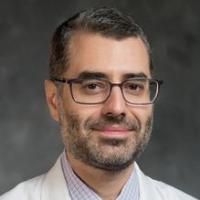Combining Heparin and a FX/Xa Aptamer to Reduce Thrombin Generation in Cardiopulmonary Bypass and COVID-19.
Date
2022-01-12
Journal Title
Journal ISSN
Volume Title
Repository Usage Stats
views
downloads
Citation Stats
Attention Stats
Abstract
Known limitations of unfractionated heparin (UFH) have encouraged the evaluation of anticoagulant aptamers as alternatives to UFH in highly procoagulant settings such as cardiopulmonary bypass (CPB). Despite progress, these efforts have not been totally successful. We take a different approach and explore whether properties of an anticoagulant aptamer can complement UFH, rather than replace it, to address shortcomings with UFH use. Combining RNA aptamer 11F7t, which targets factor X/Xa, with UFH (or low molecular weight heparin) yields a significantly enhanced anticoagulant cocktail effective in normal and COVID-19 patient blood. This aptamer-UFH combination (1) supports continuous circulation of human blood through an ex vivo membrane oxygenation circuit, as is required for patients undergoing CPB and COVID-19 patients requiring extracorporeal membrane oxygenation, (2) allows for a reduced level of UFH to be employed, (3) more effectively limits thrombin generation compared to UFH alone, and (4) is rapidly reversed by the administration of protamine sulfate, the standard treatment for reversing UFH clinically following CPB. Thus, the combination of factor X/Xa aptamer and UFH has significantly improved anticoagulant properties compared to UFH alone and underscores the potential of RNA aptamers to improve medical management of acute care patients requiring potent yet rapidly reversible anticoagulation.
Type
Department
Description
Provenance
Subjects
Citation
Permalink
Published Version (Please cite this version)
Publication Info
Chabata, Charlene V, James W Frederiksen, Lyra B Olson, Ibtehaj A Naqvi, Sharon E Hall, Ruwan Gunaratne, Bryan D Kraft, Loretta G Que, et al. (2022). Combining Heparin and a FX/Xa Aptamer to Reduce Thrombin Generation in Cardiopulmonary Bypass and COVID-19. Nucleic acid therapeutics. 10.1089/nat.2021.0077 Retrieved from https://hdl.handle.net/10161/24296.
This is constructed from limited available data and may be imprecise. To cite this article, please review & use the official citation provided by the journal.
Collections
Scholars@Duke

Bryan David Kraft
Dr. Kraft has a wide variety of clinical and research interests, including sepsis, pneumonia, and acute respiratory distress syndrome (ARDS), and has special expertise in rare lung diseases such as pulmonary fibrosis and pulmonary alveolar proteinosis (PAP). PAP can be congenital, hereditary, autoimmune, or due to occupational exposures (e.g. dusts, fibers, silica).
Dr. Kraft performs whole lung lavage (WLL) at Duke in a state-of-the art hyperbaric chamber within the Duke Center for Hyperbaric Medicine and Environmental Physiology. Performing WLL with hyperbaric oxygen (when necessary) augments oxygen delivery during the procedure, meaning both lungs can be lavaged on the same day, during a single episode of anesthesia.
Dr. Kraft’s research laboratory is devoted to understanding mechanisms of acute lung injury resolution, and uses translational models and clinical patient samples to identify novel pathways of recovery. Dr. Kraft is also an active investigator in clinical trials to develop new therapies for patients with lung diseases.

Loretta Georgina Que
My research interests focus on studying the role of nitric oxide and related enzymes in the pathogenesis of lung disease, specifically that caused by nitrosative/oxidative stress. Proposed studies are performed in cell culture and applied to animal models of disease, then examined in human disease where relevant. It is our hope that by better understanding the role of NO and reactive nitrogen species in mediating inflammation, and regulating cell signaling, that we will not only help to unravel the basic mechanisms of NO related lung disease, but also provide a rationale for targeted therapeutic use of NO.
Key words: nitrosative defense, lung injury, nitric oxide

Bruce Alan Sullenger
The main focus of my translational research laboratory is to develop RNA based therapeutic agents for the potential treatment of a range of diseases. To this end, we have and will continue to take advantage of the fact that RNA is not just a passive carrier of genetic instructions inside of cells during the conversion of information from DNA to RNA to protein. Rather, RNA is an extremely versatile biological macromolecule. Certian RNAs can bind to specific protiens with high affinities, while others can for catalytic centers and perform enzymatic reactions. These facets of RNA coupled with the ease with which RNA can be manipulated in vitro make it a very powerful and unique therapeutic agent whose potential is largely untapped. Durring our endeavors, we plan to work closely with the members of the Molecular Therapeutics program as well as other faculty at the Duke University Medical Center to expedite the development and testing of these therapeutics.
The specific aims of my laboratory are:
1. To isolate and characterize RNA and DNA aptamers which block therapeutically relavent proteins such as those involved in cardiovascular diseases and immune modulation.
2. To develop RNA-based tumor targeting strategies for delivering siRNAs and miRNAs to tumor cells.
3. To reprogram cells using mRNA delivery.
4. To explore novel methods to control inflammation.
Unless otherwise indicated, scholarly articles published by Duke faculty members are made available here with a CC-BY-NC (Creative Commons Attribution Non-Commercial) license, as enabled by the Duke Open Access Policy. If you wish to use the materials in ways not already permitted under CC-BY-NC, please consult the copyright owner. Other materials are made available here through the author’s grant of a non-exclusive license to make their work openly accessible.
